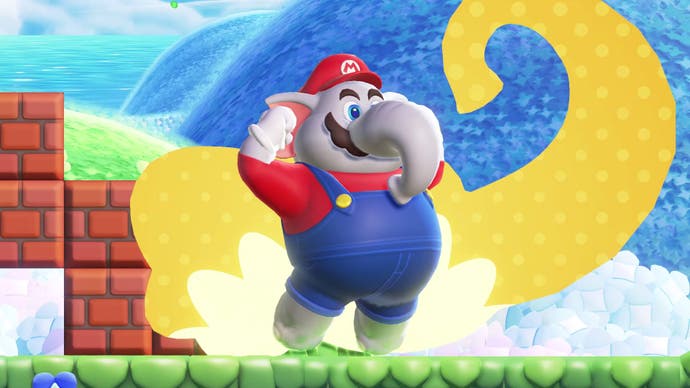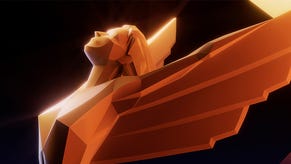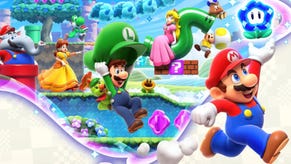Super Mario Bros. Wonder is right: Nintendo's series has always been about secrets
My shh-room kingdom.
What's Super Mario Bros. Wonder about? Reader, I could not be more excited. "In terms of the concept for creating a new Mario, we came up with the concept of mystery and secrets," director Shiro Mouri told Tom Phillips recently.
Secrets! "The first Super Mario game was full of secrets and mystery," Mouri added. "As we were developing more and more side-scrolling Mario games, the challenge became that these kinds of secrets and surprises were more and more normalised to players. So I thought it'd be important to create a side-scrolling Mario that really fit the day and age that we live in now."
This is wonderful stuff, because it's true that Mario has always been about secrets. And it's true that as the games have progressed, players have come to expect those secrets. So how Super Mario Bros. Wonder can meet and defy those expectations is something I cannot wait to see. But for the time being, I'm happy to just remember, and think back to the time when those original secrets and surprises were new. Come join me.
I think 8-bit games are my favourite of all games, and this is because back then, when I was first watching games flicker on the TV screen as my brothers played on the Commodore 64, games were absolutely filled with mystery. I didn't understand the form, so I didn't understand the parameters. I had no way of guessing what was possible. At the same time, game designers were not yet working with too many established genres. Games back then could be wild, and were frequently sui generis. Jet Set Willy's a platformer and a sequel, sure, but in its evocation of a singular place and the way its various spaces are connected, there was nothing else quite like it.
Games were always surprising, then, but I still think of Super Mario Bros. as being the first game I ever played with actual secrets. And this is because of a point that Mouri touched on with Tom when they spoke. It's because the secrets were kind of famous, even back then in 1990 or whenever.
My sister had bought a second-hand NES and it came with a copy of Super Mario Bros. The game had a reputation as a brilliant platformer, but the guy who had sold the NES to my sister - a friend of my brother's - had told her to keep an eye out for surprises. There was more to the game than we first realised, he explained. And we should maybe investigate World 1-2.
You know what happened, obviously. There are a series of moving platforms at the end of World 1-2, and if you jump high off the top of the screen you can pass by the pipe you're meant to disappear into to finish the level. From there, you enter a warp zone, where there are pipes that will take you deep into the game.
In my memory, we found this stuff almost immediately. And that's because Mario, I think, is a very good game when it comes to teaching you to push against its rules. Early on in World 1-1 you find that you can smash blocks, and when you end up underground in 1-2 and there are suddenly blocks everywhere, you're trained to smash as many as you can. Maybe you find the 1-Up mushroom that's hidden inside one, and if memory serves, it rides off along the top of the screen above the perceived limits of the playing field. That tells you you might be able to get Mario up there, and if you can...?
Mario's secrets, in other words, were a way into thinking about how the games were made. They were the beginning of a dialogue, I think. In Mario games, I always feel like I'm in dialogue with the designers. I think I've always felt this, back before I had any clue at all as to how games were constructed. Mario games - like a lot of games - are telling you how its designers think. They're telling you where they like to hide things, where they like to wrong-foot you. In a way, the impact of Super Mario and those warp pipes was a bit like the impact I felt when playing the Stanley Parable all those years later. So much in these games amounts to the designer saying to you, "You thought of that, eh? Good work. And of course, I thought of it first."
By the time we played Super Mario Bros. 2, we were on the lookout for secrets. We were ready for the idea that we might be tricked, and that working out when we were being tricked was part of the fun. Back then, we had no idea that Mario 2 was not originally Mario 2, that it had started out as something very different. We just accepted the odd things the game now did as being an evolution of Mario. Now he pulls up veg. Now he throws enemies at other enemies. Fine, on with it.
What I remember the most about this game is the level with the whales. It's left to right, as is the time-honoured tradition. But one day we were playing and as it kicked off, my sister suddenly realised that we were only assuming it was left to right. What happened if you went the other way? (This is all a distant memory, by the way, so apologies if I've jumbled some of the facts.) What happened was that there was something waiting for you there! Another warp zone. It felt like meeting up with an old friend we had not seen since Mario 1. It was the designer again: hey, we got here first once more.
By the time we got to Mario 3 and Super Mario World, I think we were both playing for the secrets as much as for anything else. I remember an old episode of Ripping Yarns where a hero is in a cottage that they feel must have a trap door or a secret passageway. They search for it and get frustrated, and then they throw something against the wall in anger and it triggers this endless wave of trap doors, secret passageways, escape ladders. A deluge. Well, Mario 3 and Super Mario World were just like that. The warps! The level gimmicks, the whole business of the Star levels in Mario World, leading to that magical crescendo? These games were like jack-in-the-boxes, waiting to erupt with endless surprises.
And that's the thing about surprises and secrets, and it's a thing I trust Super Mario Bros. Wonder's creators to remember. Finding new ways to surprise players is great, but it's also great, within all that, to find a way to remind players that this is all part of a great tradition. Whatever Wonder has in store I am sure it will be dazzling, almost overwhelming, the kind of thing that leaves you laughing in admiration. I'm also sure that some part of it will make me feel like I'm meeting the designers of Mario 1-2 again after such a long absence. "You made it here? Well done. We got here first. Again."











